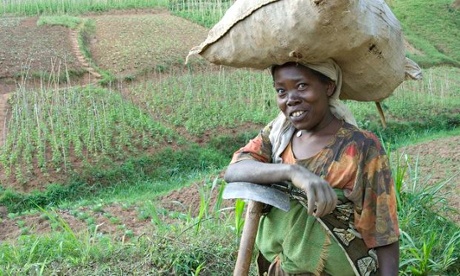Human Rights of Women
Source: The Guardian
The country's new constitution is a great milestone, but it still has to be implemented – a challenge that also remains elsewhere
Tanzanian women have until now had to rely on tenuous rights to land to feed themselves and their families.
In a milestone for Tanzania, the country's proposed new constitution provides women with equal rights to own and use land.
Women in Tanzania have until now had tenuous rights to the land they rely on to feed their families. Though Tanzania's Land Act and Village Land Act (both passed in 1999) provide for women's ownership of land, customary practices regarding marriage and inheritance continue to discriminate heavily against women. The current constitution upholds equal rights to property for men and women, but does not clarify whether the law or custom take precedent when there is a conflict. And such a conflict exists in communities across the nation, undermining women's rights.
In Tanzania, as in much of Africa, customary practices often require women to access land through their fathers, brothers, husbands or other men who control the land.
This makes women vulnerable and decreases agricultural productivity. When women lose their connection to this male relative, either through death, divorce or migration, they can lose their land, home and means of supporting themselves and their families.
The new constitutional language would override customary practices that weaken women's rights to land, according to local news reports.
The proposed guarantee of equal land rights comes at a time when there is renewed focus on the issue of women's land rights by the international development community and governments in sub-Saharan Africa, and a growing understanding of the fundamental role women's land rights plays in our efforts to address generational poverty, malnutrition and women's economic empowerment.
The issue was specifically addressed in the open working group's report to the UN on development after the millennium development goals expire next year. Women's land rights were also the subject of a panel at this year's Clinton Global Initiative and one of the focus areas of the annual World Bank land and poverty conference.
Research shows that women in Africa, including Tanzania, undertake almost half of the agricultural labour (pdf). Without legal control over the land they farm and the proceeds of their labour, women have neither the incentive, security, nor opportunity to improve their harvests. Just consider for a moment what that looks like: women know that if they irrigate their field, or plant an orchard or a high-value crop, there is a good chance that they will not be the ones to reap the benefits. Improving their harvests does not translate into more food for their families because they don't have control over their harvests or the money these harvests bring in.
Studies confirm that women are routinely allocated the smallest and least productive plots. This affects the way women farm. It affects their ability to feed their children. It affects their ability to leave abusive relationships. It affects their ability to support themselves and work towards a better future.
To improve food security (pdf) and women's status, and to meet our development goals, we need to change women's relationship to the land from farm labourer to farm owner and manager.
Knowledge of the fundamental role women's land rights play has prompted changes in laws and policies elsewhere in east Africa. In 2010, Kenya adopted a new constitution that granted women unprecedented protection of their right to own land and other family resources. Over the past decade Rwanda has worked to ensure that women's land rights are protected as the country rolled out its land documentation programme. And seven years ago, Ethiopia launched a public awareness campaign aimed at improving understanding of women's land rights alongside its rural land certification process. These changes have provided many women in these countries with unprecedented rights, protections and freedoms.

A farmer in Rwanda, a country that has worked to ensure that women's land rights are protected through its land documentation programme.
Photograph: Deborah Espinosa/Landesa
Of course, we know that enacting laws that support women's right to land – while a great milestone – does not bring all women to the finish line. Women's land rights have to be fully implemented. This is a challenge around the world.
In India, a study by UN Women India and Landesa found that despite their time spent working in orchards, cotton fields and rice paddies, women rarely inherit the land that has sustained them and which they have sustained.
The survey of more than 1,400 women and 360 men in agricultural districts with large numbers of female farmers in three Indian states – Andhra Pradesh, Bihar and Madhya Pradesh – found that only one in eight women whose parents own agricultural land inherit or expect to inherit any of it.
This is the case even though the government of India amended its inheritance laws in 2005 to ensure daughters enjoyed equal rights to inherit their parents' land and property.
The research found that female inheritance is so rare that two-thirds of the women surveyed didn't know of any woman who had inherited land from her parents and one in four did not know that they have a right to inherit family land.
The applause that Tanzanian MP Andrew Chenge received last week when he read the clause pertaining to women's ownership rights in the new constitution to the constituent assembly was well deserved. But let's make sure the cheering was not premature. The constitution still needs to be adopted in next year's plebiscite and the new provisions implemented to allow female farmers in Tanzania to reach their fullest potential.
• Jennifer Duncan is Africa programme director for Landesa. Scholastica Haule is women and land rights adviser at ActionAid International Tanzania
